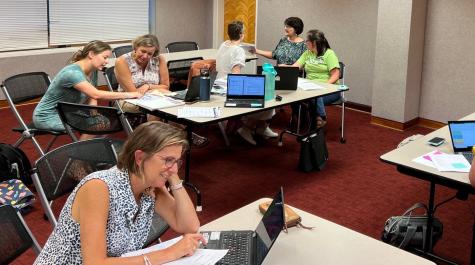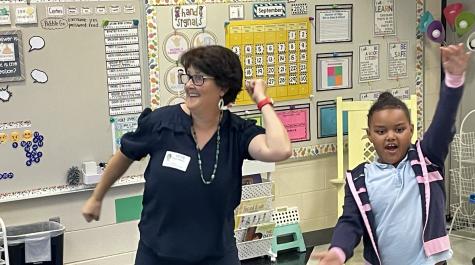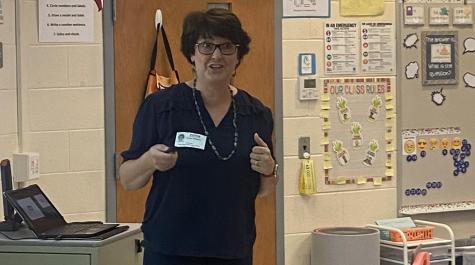Literacy Lab Outreach Empowers Local Teachers and Students
The William & Mary Literacy Lab hosts a professional development Summer Intensive, but it is more than a seasonal endeavor. It is a year-round commitment to enriching literacy education and supporting local teachers and students. The Literacy Lab provides significant outreach opportunities, including professional development and networking for educators, reading tutoring in local schools, and classroom experience for William & Mary students.
One such initiative is the Literacy Lab’s annual Data Dive, hosted this year on September 14. During this event, area teachers bring the literacy assessment data they have collected on their students and analyze the information in a group of experts and peers. The Data Dive allows teachers to collaboratively interpret student data and determine what it means for their individual classroom needs.
Amy Elliott, a dedicated kindergarten teacher who has attended every Data Dive, emphasized the significance for her teaching: “Kindergarten data is not always straightforward, and there are many to consider when we are creating reading groups. Other sets of fresh “expert eyes” and different perspectives we might not have thought of are often needed to help us make the best decisions for our students. When I leave, I am confident I have made the best decisions for my students’ placement.”
The Literacy Lab also takes its expertise directly into partner schools. Tamara Williams, a former reading specialist who recently joined William & Mary as a clinical instructor, modeled a phonics lesson in a second-grade classroom at James River Elementary. This hands-on engagement benefits both the Lab and teachers alike, breaking down the barriers between theory and practice.
“We love opportunities to visit schools and work directly with students and teachers,” notes Kristin Conradi Smith, associate professor of reading education and co-director of the Literacy Lab. “For us, it staves off the ‘Ivory Tower syndrome’ of being too disconnected from the day-to-day realities of K-12 education. And for teachers, it allows them to sit and observe others in action. Teachers can learn so much from observation, but the reality of their hectic schedules often makes this unfeasible.”
Literacy Lab professional development extends beyond the classroom. The Lab hosts monthly meetings for teachers to discuss reading research and best practices.
“Teachers are hungry for professional learning that meets their needs and bridges the research-to-practice gap. Our monthly meetings allow teachers to learn research-based instructional strategies in a low-risk and supportive environment,” says Williams. “When we come together, teachers share what they’ve tried, express how it went, and learn from one another. It’s also a great opportunity for teachers to see how schools in neighboring divisions are changing instruction to meet the requirements of the Virginia Literacy Act.”
In addition to professional development programming, the Literacy Lab partners directly with schools to deliver explicit reading instruction. Last year, approximately 25 William & Mary undergraduate students volunteered through the Griffin School Partnerships to work with the Literacy Lab and provide weekly one-to-one tutoring for 28 Clara Byrd Baker Elementary students and 18 students at James River Elementary school. The Literacy Lab worked closely with the reading specialists to identify which students would benefit from the tutoring and which specific literacy skills needed support. The William & Mary tutors were trained in effective literacy practices, by Literacy Lab co-director Debbie Ramer, and they implemented evidenced-based, targeted lesson plans from leading research in the field. More than 100 students have signed up to serve as Literacy Lab tutors at three local elementary schools this fall.
“Participating in the Literacy Lab has been an incredibly fulfilling experience and an absolute highlight of my time at William & Mary,” says Alison Mayer, a tutor and incoming Literacy Lab Student Coordinator. “This past year, I worked with two students at Clara Byrd Baker Elementary School. In this time, I saw significant growth, not only in their literacy abilities but in their confidence as a student and person as well. I am continuously reminded of the importance of the Literacy Lab as I witness our tutors form meaningful connections with their students while simultaneously helping them progress academically.”
Meeting the needs of students and teachers in a range of settings, the Literacy Lab demonstrates its commitment to improving literacy education and fostering meaningful connections within the community.

